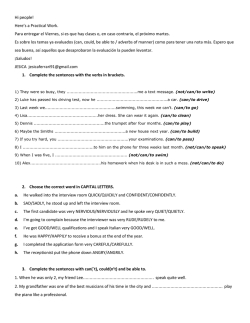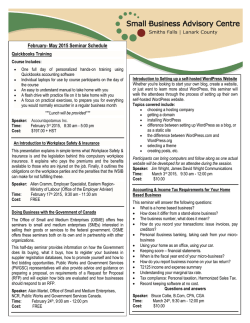
OPI Tester Interview Review Grid Spanish IVR
OPI Tester Interview Review Grid Spanish IVR # 130833 Rating: IM T Tasks Warm-Up/ Gathering information/checking understanding Gathering information/checking understanding Gathering information/checking understanding Create with the language Level of task N/I/A/S At level Response? Topic Questions Yes Partially No Evidence/Examples N University ¿Ud. está en New Paltz? X Speaker answers and adds some basic information, sentence level, problem with verb formulation (faulty stress and/or wrong person marker—asistió? for asisto) N Studies ¿En qué año está? ¿Está en su año final de estudios? X Speaker answers affirmatively. N University Hábleme de la universidad. ¿Cómo se llama? X Speaker provides name. I University location ¿Dónde está New Paltz? X Speaker provides location, sentence level. One sentence response. Facilitating question/Identifying motivating topics Checking understanding I Weather/Location ¿Allí es donde ha nevado tanto? […] ¿Ud. vive donde hay mucha nieve? X N Location ¿A cuánta distancia queda Buffalo? X Checking understanding N Weather Pero… hace mucho frío donde está Ud. ahora, ¿no? X Create with the language I Community Hábleme de New Paltz. ¿Cómo es esa ciudad? X Create with the language I Community ¿Hay algún inconveniente de vivir allí? X Two-sentence reply. Speaker is creating with the language. X Delivery requires a sympathetic listener. Speaker responds in sentences, some rudiment of paragraph (use of connector debido a eso) Misunderstanding. After repetition, speaker repairs conversation and answers the question. Speaker replies in one sentence, recombining (almost repeating) what she heard from the tester. Speaker answers in sentences, some general description. Several gender problems. Delivery requires a sympathetic listener. Create with the language I University ¿Y la universidad? ¿Cómo es esa universidad? Create with the language I University life ¿Y qué hace Ud. con la policía? X Speaker is creating with the language. Speaks in sentences. Classes. Cuénteme de sus estudios. X Speaker creates with the language. Some accuracy problems in basic structures (soy Create with the language I en las clases de…; un clase). Checking understanding/ building confidence N Classes Cuántos créditos son, en total? X Speaker provides requested information. Identifying motivating topics N Work ¿Y tiene un trabajo también? X Speaker responds and adds some information. She is creating with the language. Creating with the language I Work Hábleme un poco de ese trabajo que antes tenía X Two-sentence reply. Description A Work ¿Y cómo es el restaurante? Produce list N Dishes ¿Y cuáles son los platos especiales que sirven ahí? X As an Advanced level task, response is not at level. The speaker creates with the language, produces some sentences and some fragments of sentences (La gente y la empleadores muy interesante—no verb). X Speaker produces a (short) list of dishes. Delivery requires a sympathetic listener. Create with the language I Pastimes ¿Qué le gusta hacer para divertirse? X Speaker creates with the language, talks about pastimes in sentences. Delivery requires a sympathetic interlocutor. Speaker is able to repair the exchange by explaining the meaning of “oldies.” Identifying motivating topics N Travel ¿Y Ud. ha tenido la experiencia de viajar a otro país? X Speaker produces some sentences about Spain. Response at Intermediate level: the speaker creates with the language, produces sentences to describe and contrast some generic, isolated aspects of life in both countries. Noticeable problems of accuracy in basic structures (Las personas son simpática y generosa; los ciudades son nuevos) A Life in Spain and in the USA Cuénteme algunas diferencias entre la vida allá, en España, y la vida aquí, en EE.UU., según su perspectiva. Create with the language I Toledo Y le interesó mucho Toledo, ¿verdad? ¿Por qué? X Some sentences to provide a generic, simple description of Toledo. Facilitating question/Identifying motivating topics N Study abroad ¿Y Ud. estaba estudiando en España? X A one-sentence response. Describe and contrast X Past narration A An experience in Spain Cuénteme de esa experiencia. ¿Vivió con una familia o…? X Question does not generate a past narration. A three-sentence response with unsuccessful use of structure to convey meaning (Hace dos semanas que nosotros vivimos en Toledo y hace dos semanas que vivíamos en Sevilla). Past narration A An experience in Spain Cuénteme alguna experiencia que Ud. tuvo allí… algo inesperado. X No past narration. Some sentences, some simple description, accuracy problems Past narration A An experience in Spain Facilitating question/Follow up A An experience in Spain ¿Y me puede contar algo que ocurrió? ¿Algún evento inesperado o sorprendente o gracioso o tal vez algo frustrante? ¿Y había alguien allí ayudándola? Past narration A An experience in Spain Pues cuénteme exactamente lo que pasó. Entró con su amiga, ¿verdad? Past narration A An experience in Spain ¿Y alguna vez tuvo alguna dificultad Ud. o alguien en el grupo […]? N/A An experience in Spain ¿Cuánto tiempo tuvieron que esperar? A An experience in Spain ¿Cómo reaccionaron los otros estudiantes? Facilitating question/Encouraging narration Past narration X Some sentences, some use of past tense, no narration, lots of accuracy problems (yo nunca encontró; necesito tratando todos los zapatos para encontré). X One-sentence reply in present tense. X X N/A N/A N/A X Some narration in the past, some use of past tense. Wrong person markers, accuracy problems, but speaker is able to stay in the past most of the time. She resorts to the present on one occasion (trae los zapatos) but is able to stay in the past most of the time. Good sequencing of actions in the past, but text form is hardly a paragraph. There is some very rudimentary sense of paragraph (Cuando…) but the text is more a series of sentences than a paragraph. Basic information of the “story” is missing (i.e. the tester has to ask if she ended up buying the shoes) No narration, a series of sentences in the present, infinitive, some past tense. Lots of person marker problems that interfere with understanding of the incident. Speaker responds. No additional narration. Speaker adds information but unsuccessful use of verb tenses interfere with meaning. Only a very sympathetic listener can decipher meaning and time frames. No past narration. Some sentences, some simple description, but no paragraph, no story. Facilitating question/Identifying motivating topics N Teaching ¿Ha tenido al experiencia de estar en un salón de clases con estudiantes ya? Past narration A First teaching experience Cuénteme de su primer encuentro con los estudiantes. Cuénteme de un problema que tuvo Ud. o tal vez un problema que tuvo el maestro o la maestra. Quisiera saber algo sobre un incidente, algo que ocurrió con un estudiante un poco frustrante. X Attempt at narrating but the speaker resorts to the present (Hay un estudiante; presta atención). Basic details of the story are missing. X X Past narration A A teaching experience Past narration A A teaching experience ¿Y qué hizo la maestra? X One sentence response in the present. Past narration A A teaching experience ¿Y qué pasó después? X Speaker tries to end the “story” but uses the present and the infinitive intermingled with some past tense. No paragraph, problems with accuracy and lexical control. Only a very sympathetic listener can understand what happened. Account of accident is done at a very basic Intermediate level. Most of the “narration” is in the present, with lots of accuracy problems, wrong verb formulations, and wrong person markers. Speaker cannot deal effectively with an unanticipated complication. She would need a very sympathetic listener to decipher meaning and understand the accident. Role-play A A car accident You borrowed a friend’s car and had a slight accident. Call him. Asking questions I Various Quiero que Ud. me haga a mí algunas preguntas Speaker asks several questions with good sense of structure and accuracy. Various ¿Y Ud.? ¿Qué prefiere Ud.? ¿Cuáles son sus planes para el resto del día? ¿Cuándo se gradúa? Speaker answers, creating with the language. Wind-down X OPI Rating Rationale Spanish IVR # 130833 Rating: IM This OPI is rated IM because: Speaker can create with the language. She can talk about a variety of topics necessary for survival in a Spanish-speaking context, such as community, self, studies, work, housing, and plans. Speaker functions mainly reactively; that is, needs an active interlocutor who carries the conversation. Speaker needs a sympathetic listener used to dealing with non-natives. Speaker communicates in phrases (sometimes isolated sentences, sometimes strings of sentences). Very rarely does she produce rudiments of paragraphs (i.e. when talking about experience in the shoe store in Spain). Accuracy is appropriate for the level. Inaccuracies often occur in pronunciation (faulty stress, incorrect sounds, definite L1 interference), grammar and syntax (gender/number agreement, wrong verb forms, conjugations, and person markers) but she is able to communicate the message. Speaker can ask questions. ……………………………………………………………………………………………….. It is NOT rated IH because: Speaker does not function at Advanced level most of the time. She consistently resorts to the present and the infinitive when trying to provide an account in the past. Even though she can produce discourse about present and future, she does not produce narration in any time frame. Speaker does not communicate in paragraphs most of the time. Her text type is clearly sentences and strings of sentences. Her delivery is not comprehensible to an interlocutor not accustomed to dealing with non-native speakers most of the time. She definitely needs a sympathetic listener. ……………………………………………………………………………………………….. It is NOT rated IL because: The speaker’s utterances are not filled with hesitancy, inaccuracies, and selfcorrection. There are clear problems of grammar and syntax, but she has a clear sense of sentence discourse and can organize her speech to convey meaning in this text type. When misunderstandings occur, she is able to repair the conversation most of the time. Even though she definitely needs an interlocutor who takes on the main responsibility of the exchanges, she goes beyond a one-sentence answer and generally provides more personal information covering self, school, interests, likes, and dislikes. She goes beyond what she hears from the interlocutor. The speaker can be understood by a sympathetic listener despite L1 interference in pronunciation.
© Copyright 2026





